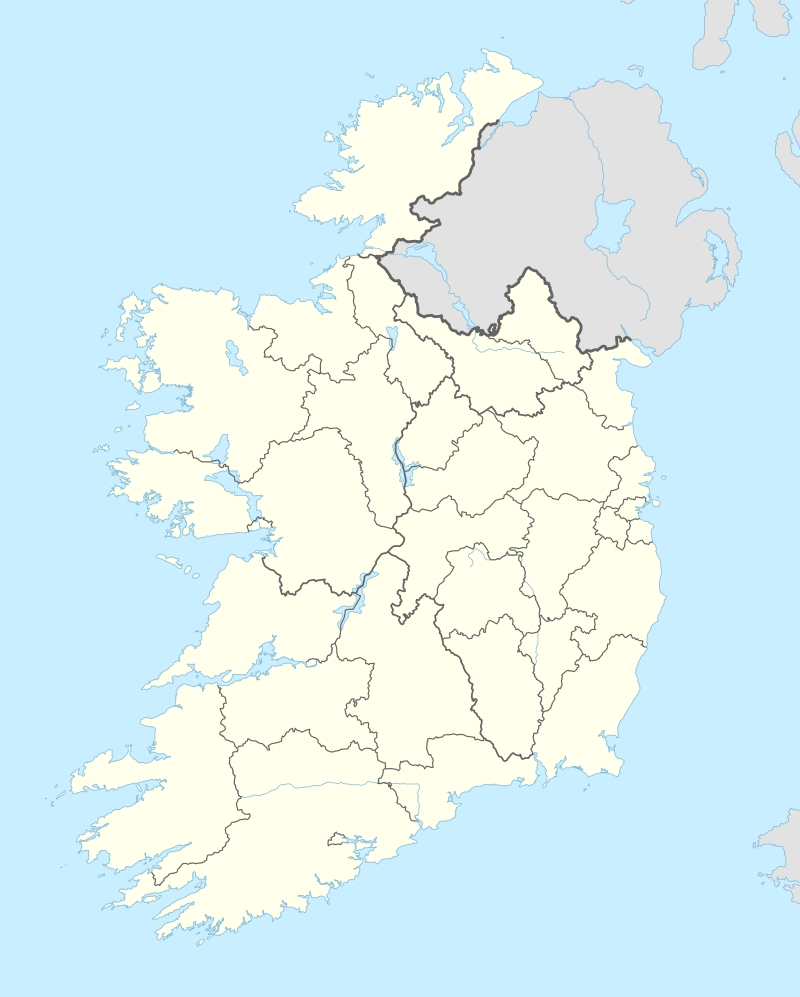Newtowngore
| Newtowngore An Dúcharraig | |
|---|---|
| Town | |
 Newtowngore Location in Ireland | |
| Coordinates: 54°02′35″N 7°40′23″W / 54.0431°N 7.6731°WCoordinates: 54°02′35″N 7°40′23″W / 54.0431°N 7.6731°W | |
| Country | Ireland |
| Province | Connacht |
| County | County Leitrim |
| Time zone | UTC+0 (WET) |
| • Summer (DST) | UTC-1 (IST (WEST)) |
Newtowngore or Newtown Gore, known before the Plantations of Ireland as Ducarrick[1] (Irish: An Dúcharraig, meaning "the black rock"), is a village on the R199 regional road in County Leitrim, in the north of the parish of Carrigallen.[2]
Newtown Gore
The parish contains 1,500 statute acres, including a great quantity of bog: the cultivation is principally by spade labour; limestone of the best kind is quarried at Newtown-Gore. The village comprises about 100 houses. It has a market for grain and provisions on Monday; and fairs are held in April, 4 May, 9 August, 8 October, and the last Friday in December. Fairs are also held at Longfield on 17 May, 10 October and 29 December. There is a penny post to Killesandra and Ballinamore; and a constabulary police force has been stationed here. Petty sessions are held every alternate Saturday, but the manor court has been discontinued since the institution of the assistant barrister's court.[3]
Public transport
Bus Éireann route 462 serves the village on Saturdays providing a link to Sligo via Ballinamore and Drumshanbo.[4]
Woodford Estate
Woodford (Estate) Collins – Robert Collins was the lessor of several townlands in the parishes of Drumreilly and Oughteragh, baronies of Carrigallen and Mohill, at the time of Griffith's Valuation.
(Estate) de Courcey – The de Courcey family held land in the parish of Drumreilly, barony of Dromahaire in the mid-nineteenth century.
The de Courcey family held land in the parish of Drumreilly, barony of Dromahaire in the mid-nineteenth century.
(Estate) Palmer (Leitrim) – The Palmer family were resident at Sriff or Shriff from at least the end of the eighteenth century. They held lands in the parishes of Drumlease and Drumreilly, barony of Dromahaire in the mid-nineteenth century. Henry Manly Palmer of Sriff was a member of the Grand Jury for Leitrim in 1851. Isabella Palmer of Drumkeel is recorded as owning over 1,300 acres (5.3 km2) in Leitrim in 1876. Thomas Robert Palmer, living at Friarstown in the 1870s, owned over 1,600 acres (6.5 km2) in County Leitrim at that time. This family intermarried with the Cullen family of County Leitrim on a number of occasions.
Moy Abbey
The Tripartite Life of St Patrick says that when Patrick was on his way to Magh Slecht to destroy Crom Cruaich, he founded a church and ordained a priest to look after it named Bruscus. The site of this Patrician church is thought to have been near Newtowngore. The ruin in the grounds of the present Church of Ireland in Newtowngore is more likely the medieval church of Moy, which was dedicated to St Patrick. Apart from this we know nothing of the early ecclesiastical history of Carrigallen. There are two holy wells dedicated to the saint, one in Aughawillan and the second in Beaghmore. Nearby the latter is a wart stone where people used to make the cure of the warts by washing them in the water which lay in a hollow in the stone in Moy Abbey in 1345.
History
Throughout at least the 19th and 20th centurys, a number of fair days were held at Newtowngore on- February 25, May 25, June 26 (or 28th), August 25, October 15, and November 25.[5][6]
References
Primary sources
- ↑ Placenames Database of Ireland
- ↑
- ↑ Samuel Lewis (1840). A topographical dictionary of Ireland comprising the several counties, cities, boroughs corporate, market, and post towns, parishes and villages ... : With an appendix describing the electoral boundaries of the several bouroughs as defined by the act of the 2d. and 3d. of William IV. Lewis. p. 279.
- ↑ "Archived copy" (PDF). Archived from the original (PDF) on 24 January 2013. Retrieved 4 May 2013.
- ↑ Longman 1819, pp. 405.
- ↑ Watsons 1830.
Historical
- Longman (2011) [1819]. Traveller's New Guide Through Ireland, Containing a New and Accurate Description of the Roads (digitized from original in Lyon Public Library ed.). Longman.
- Watsons (1830). The Gentleman's and citizen's almanack ... for the year (PDF). Dublin, Printed for S. Watson [etc.]